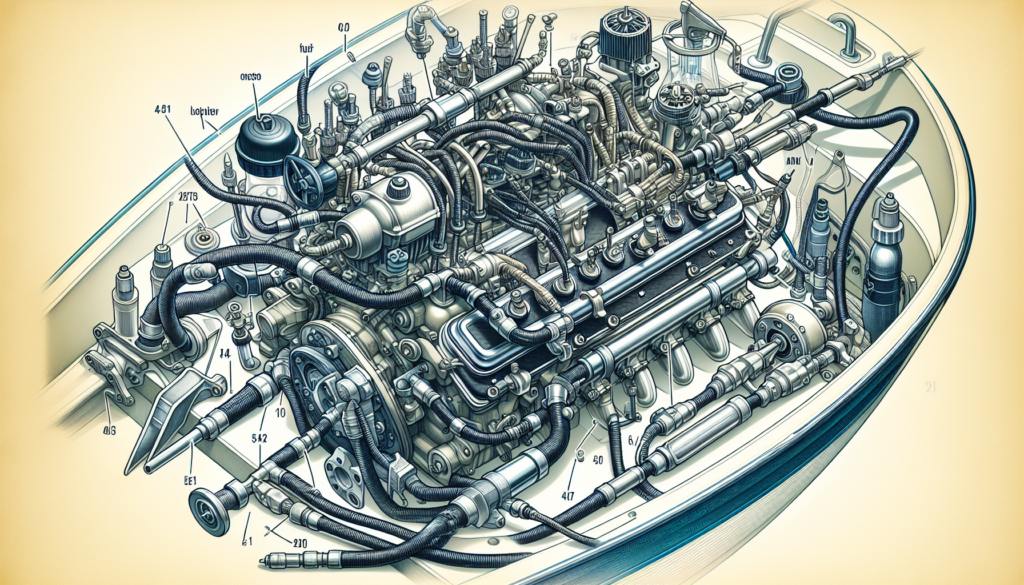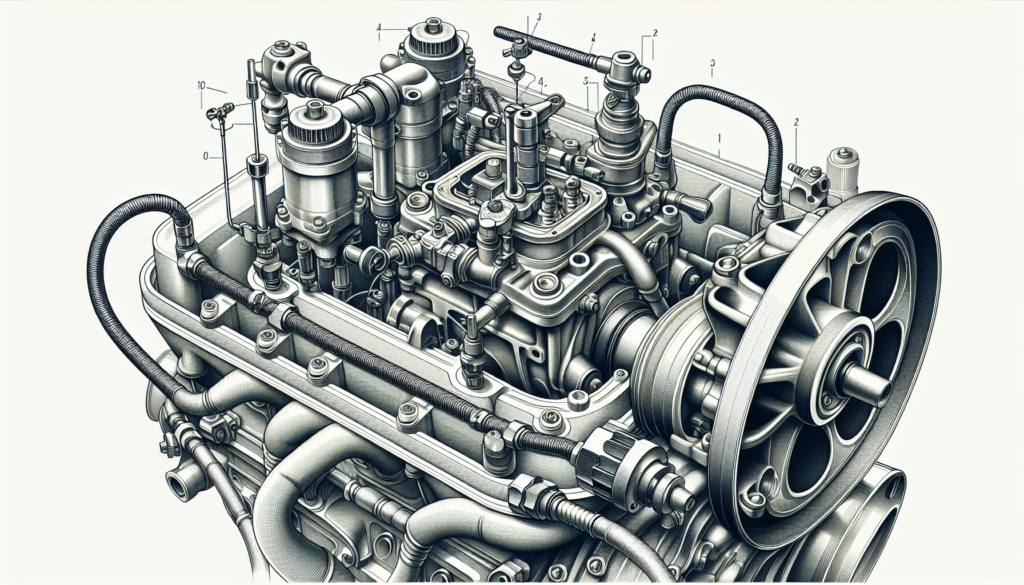Aha! So, you’re looking to get savvy about boat engine fuel system Troubleshooting? Perfect! In this helpful guide, you’ll walk through the steps necessary to detect and resolve issues in your boat’s engine fuel system. Whether you’re an absolute newbie or a seasoned boating enthusiast, you are sure to gain valuable knowledge, paving the way for smoother sailing. Channel your inner mechanic and let’s get you back on the water faster!

Understanding the Boat Engine Fuel System
The boat engine fuel system is an essential operational component in every watercraft. Without it, your boat engine wouldn’t receive the fuel it needs to run effectively. Understanding how this system works and its components helps you maintain and troubleshoot it, which leads to a smoother sailing experience.
Components of the Fuel System
The boat fuel system is composed of various critical components that must be continual tip-top condition for optimal performance. These mainly include the fuel tank, the fuel pump that transfers fuel to the engines, fuel lines that serve for transportation, and fuel filters that clean out unwanted particles. The precise configuration and number of these components may vary depending on your boat model and engine type.
How Does the Fuel System Work?
Each of the aforementioned components perform important roles within the fuel system. The fuel tank stores the gas or diesel needed to power your boat. The fuel pump, usually an electric or mechanical unit, pulls the fuel from the tank and moves it towards the engine. The fuel travels through the fuel lines, which connect the tank, pump, and engine. The fuel filters are strategically positioned to catch any dirt or contaminants that may harm the engine before the fuel reaches it.
Common Boat Engine Fuel System Problems
Even with regular maintenance, you may sometimes encounter issues with your boat’s fuel system. Here are several common problems to watch out for:
Fuel Leaks
Leaking fuel is a serious issue that poses both a fire hazard and an environmental threat. It’s vital to address such leaks as soon as they’re detected.
Dirty or Clogged Fuel Filters
If your boat’s performance drops, or the engine struggles to start or stay running, then a dirty or clogged fuel filter might be the cause. Regular inspection and cleaning or replacing of these filters is an effective preventive measure.
Faulty Fuel Pumps
Faulty fuel pumps can cause a variety of symptoms, from hard starting to poor performance at high speeds. If you notice such behaviors, it could be time to check your fuel pump.
Damaged Fuel Lines
Aged or damaged fuel lines can lead to fuel leaks and subsequent engine damage. Regular inspections ensure your lines stay in good condition and replace them when necessary.
Water in the Fuel
Water contamination in your fuel tank can hurt your engine’s performance and potentially cause some severe damage. If you notice any signs of water in your fuel, you should deal with it immediately.
Diagnosing Fuel Leaks
Suspecting a fuel leak isn’t something to take lightly, and it’s crucial to diagnose accordingly.
Identifying the Smell of Leaking Fuel
If you smell a strong gas or diesel odor around your boat, it may indicate a potential fuel leak. Trust your nose because it’s the first warning sign.
Checking for Visible Signs of Leakage
Fuel leaks often leave visible evidence. These may include rainbow-colored stains on the water near your boat or patches of discoloration on your bilge or engine.
Examining the Bilge for Fuel Presence
Regularly checking the bilge can alert you to problems early on. If you find any fuel in the bilge, it suggests a leak somewhere in your fuel system.
Handling Dirty or Clogged Fuel Filters
Fuel filter maintenance is one of the cornerstones of healthy boat performance.
How to Identify a Clogged Fuel Filter
If your boat engine stumbles or hesitates during acceleration or at high speeds, a clogged fuel filter might be the culprit. A quick examination of the filter element often shows if it’s contaminated.
Cleaning and Replacing the Fuel Filter
You can usually clean reusable fuel filters, while others require replacement. Always consult your boat and engine manuals to determine what is appropriate for your specific situation.
Prevention of Fuel Filter Clogs
The easiest method to prevent fuel filter clogs is regular maintenance. Regularly changing the fuel filters based on manufacturer’s instructions helps ensure a clean flow of fuel to your engine.

Troubleshooting Faulty Fuel Pumps
Fuel pumps play a critical role in your engine’s performance and should be well maintained.
Symptoms of a Faulty Fuel Pump
Hard starts, poor fuel efficiency, engine misfires or loss of power during operation may all be signs of a faulty fuel pump.
Testing the Fuel Pump
To confirm your suspicions, you can test the fuel pressure using a fuel pressure gauge. A reading outside the manufacturer’s specifications often indicates a problem.
Replacing a Faulty Fuel Pump
If tests confirm a malfunctioning fuel pump, it’s usually best to replace it entirely. This job may require professional help, as improper handling can cause further damage.
Dealing with Damaged Fuel Lines
Fuel lines offer a route for the fuel to travel, and maintaining them in good condition is essential.
Detecting Inner Lining Wear and Tear
Inside the line is a flexible core, or inner lining. Over time, this lining can break down, leading to potential leaks. Regular checks can help catch wear before it compromises your fuel system.
Checking for Loose Connections
Loose connection points can leak fuel. Regular maintenance should entail tightening these connections to prevent such leaks.
Steps to Replace Damaged Fuel Lines
If damage is identified in your fuel lines, they need to be replaced immediately. These procedures can vary depending on the style and location of the lines, so consulting the relevant manuals or a profession is likely necessary.
Addressing Water Contamination in the Fuel
Water in your fuel can cause severe damage to the engine, making it crucial to address this issue promptly.
Spotting Signs of Water Contamination
If your boat engine sputters, stalls, or shows significantly reduced performance and fuel efficiency, water in the fuel may be responsible. In some cases, you might be able to spot water in the fuel filter or fuel lines.
Removing Water from Boat Fuel
Removing water from boat fuel can be a complex task and requires a professional or a comprehensive set of instructions. However, some retail products are designed to help disperse water in fuel, at least in small volumes.
Preventing Future Water Contamination
Prevention methods can include using quality fuel with appropriate stabilizers, maintaining your fuel system, and ensuring your fuel cap seal is intact.
Understanding Fuel System Maintenance
Regular maintenance enables you to prolong the life of your boat’s fuel system and avoid many common problems.
Regular System Check-Ups
As with all machinery, a regular check-up of your boat’s fuel system will help identify potential problems before they cascade into serious issues.
Changing Fuel Filters Periodically
Changing fuel filters as recommended by your boat’s manufacturer is a crucial task in fuel system maintenance. This ensures that your engine always receives clean fuel.
Inspecting and Cleaning Fuel Tanks
Clean fuel must start from a clean tank. Regular inspections and the occasional deep cleaning of your tank can help mitigate any potential contaminants.
Safety Precautions during Fuel System Troubleshooting
It’s worth remembering that working with a fuel system comes with inherent dangers.
Proper Ventilation
Always ensure there’s plenty of fresh air when working on your boat’s fuel system, as fuel can emit hazardous fumes.
Fire Safety Measures
Keep open flames and ignition sources far away from your work area and always have a fire extinguisher at hand in case of accidents.
Correct Disposal of Used Fuels and Filters
When disposing of used filters or draining fuel, always do so in a manner that’s consistent with local laws and regulations.
Learning from Troubleshooting Experiences
Every experience in troubleshooting can provide a learning opportunity.
Documenting Your Findings
Keep a record of the issues you’ve diagnosed and resolved. This information can be quite valuable in the future, especially if similar symptoms reappear.
Learning to Anticipate Common Issues
With time and experience, you’ll start to anticipate common problems before they emerge, allowing you to prevent them efficiently.
Mastering the Basics of Fuel System Care
Understanding the basics of fuel system care through both study and hands-on experience will ensure you’re well equipped to handle any potential problems. Soon enough, boat engine fuel system troubleshooting becomes second nature, making your boating experience more smooth and enjoyable.


[…] the importance of fuel system flushing is essential for any boat owner. Fuel system flushing plays a crucial role in maintaining the […]